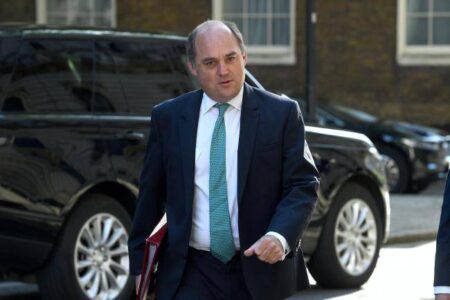
Islamic State group is most significant terrorist threat to the UK
Terror group Islamic State (IS) remains the “most significant” threat to the UK and its potential resurgence should “concern us all”, the Defence Secretary has warned.
Ben Wallace said an estimated 360 people from the UK who travelled to Syria and Iraq to fight for the terror group, also referred to as Daesh, remain in the region either at large or in detention.
RAF aircraft have struck 40 terrorist targets as part of operations against IS in the last 12 months but the “hard fight” is “by no means done” despite the group having lost control of territory it once held in Syria and Iraq, Mr Wallace also told MPs.
Making a statement to the Commons, Mr Wallace explained: “These targets range from caves occupied by Daesh terrorists in remote areas of northern Iraq, to weapons caches, bunkers and training camps – and included the destruction of two Daesh strong points engaged in close combat with Iraqi security forces.”
But he added: “The threat from Daesh, I’m afraid, remains.
“Their poisonous ideology continues to endure, their pernicious influence continues to spread.
“Conflict, economic collapse and inequality is creating new opportunities that they will continue to exploit, to grow and recruit.”
He continued: “The prospect of their resurgence should concern us all. As long as they are able to operate over there, they can hit our citizens over here.
“Daesh retains its intent to carry out and inspire attacks against us, and remains the most significant terrorist threat to the United Kingdom and our interests.”
Mr Wallace said the Iraqi security forces still require assistance, with the UK providing training and mentoring plus air support.
He added: “The terrorists have nowhere to hide, we’ve destroyed bunkers and hidden bases, but this is a long-running effort. Indeed, since the beginning of this year I have authorised 10 strikes alone on Daesh.”
Mr Wallace also said the UK remains “determined” to ensure those who have fought for or supported IS should “pay for their crimes”, adding it should occur under the “most appropriate jurisdiction, often in the region where the crimes were committed”.
Around 900 of the foreign fighters who travelled to the region during the conflict came from the UK, MPs were told.
Mr Wallace added: “Of these, approximately 20% have been killed, 40% have returned to the United Kingdom where they have been investigated and the majority assessed now to pose no risk or a low security risk, and some 40% remain in the region – either at large or in facilities managed by the Syrian Democratic Forces or others.”
His comments come against the backdrop of Court of Appeal judges ruling that Shamima Begum – one of three east London schoolgirls who travelled to Syria to join IS – should be allowed to return to the UK to challenge the deprivation of her British citizenship.
Ms Begum, now 20, travelled to Syria in February 2015 and lived under IS rule for more than three years before she was found, nine months pregnant, in a Syrian refugee camp in February last year.
Then-home secretary Sajid Javid revoked her British citizenship on national security grounds later that month, with Ms Begum taking legal action against the Home Office.
Shadow defence secretary John Healey reaffirmed Labour’s commitment to the UN-sanctioned global coalition against IS and welcomed its success.
But he noted: “It is also clear that Daesh is stepping up its insurgent attacks and must be at risk of it gaining a foothold south of the Euphrates in the area controlled by the Syrian regime, backed by its Iranian and Russian allies.”
Source: Enfield Independent





